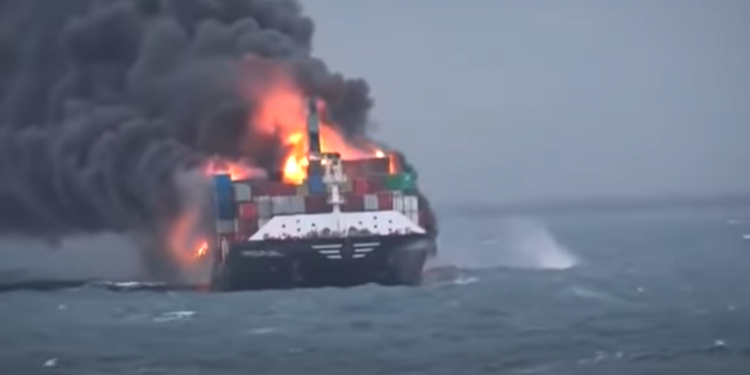According to statistics by the P&I Clubs, fires in cargo areas are rare, compared with fires in the engine room or fires originating from an electrical unit. However when a fire starts anywhere on board, it is a serious issue as it can spread quickly and be particularly difficult to control, often resulting in the crew abandoning ship.
In 2021, a fire on board the container ship X-Press Pearl resulted in total losses, highlighting that cargo fires are a priority concern. In particular, according to last Allianz Safety and Shipping Review report, there have been over 70 reported fires on container ships alone in the past five years. These fires often start in containers and can be the result of mis-/non-declaration of hazardous cargo, such as chemicals and batteries.
‘’About 5% of containers shipped consist of undeclared dangerous goods. These might be improperly packed and stowed on-board, which can result in ignition and or/ complicate detection and firefighting. The more containers on board, the higher the probability that at least one could ignite and cause a fire, and the harder it is to contain and extinguish it’’ Allianz noted.
Lessons learned from recent cases
The risks onboard cargo vessels vary; they can start in cargo holds due to malfunctions or short circuits in vehicles or even due to cargo hold lights. In particular, a past incident reported by the Transport Accident Investigation Commission of New Zealand found that fire was caused by a failure with the use of means of lighting in ships cargo holds. In that regard, the investigation report highlighted the importance of having in place related procedures that ensure cargo hold lighting systems are turned off (and, if necessary, isolated) at an appropriate time before a loading operation creates the hazard.
Furthermore, breach or water ingress can affect the stability of the vessel and open decks can allow fires to spread quickly. Also, the short turnaround times of vessels while in port, it may result in sailing before the crew have made the necessary checks that secure reduced risk of fire or shift of vehicle cargos. In any case, it is of outmost importance safety procedures to be documented and include systems for checking that they have been carried out.
A case study by the Swedish Club, showcased an incident in which explosion caused by fumigation. In that regard, the Club highlighted fumigant to be applied according to the correct instructions. As holds are always unventilated for a time after fumigation, there may be a risk of excessive condensation, which can produce sweating or dripping. This can lead to cargo damage as well as the fire and explosion risks. The weather conditions and cargo conditions, such as moisture content, therefore need to be considered properly before fumigation, which is often carried out by specialist companies.
Citing another case, the Swedish Club mentioned that cargoes which include calcium hypochlorite and other oxidising solids, often used for swimming pool sterilisation and fabric treatment (bleaching or washing), can result to a self-heating process and to ‘thermal runaway’ with very rapid self decomposition and evolution of heat and gases, sometimes including further oxygen. The effects of this in a hold can be similar to an explosion while the heat and oxygen produced can lead to fire spreading.
Potential causes of self-decomposition incidents include:
- Exposure to heat e.g. solar radiation (before or after loading), cargo lights and heated fuel tanks.
- Cargo formulation.
- Contamination of cargo at manufacture.
- Spillage and thus reaction between cargo and combustibles e.g. timber.
- Excess quantity of cargo in containers giving insufficient dissipation of heat
- Inadequate separation of packages in containers, also giving insufficient dissipation of heat.
In another case, fire was caused because a number of cargo lights were operating while cargo covered them, so the lights ignited the cargo. There was a lack of information onboard about how the light circuits were connected and how the light system should be operated while there was also a lack of records concerning use of the lights, the Swedish Club mentioned. Many bulk carrier/general cargo holds have fixed cargo lights. Halogen-type lights can easily ignite combustible cargoes such as grain, animal feed, wood chips, pulp and paper if they are too close to the light.
Therefore, cargo lights in holds need to be properly isolated before cargo is loaded. This is best done by removing fuses or other physical links in the electrical circuits so that the lights cannot be switched on by mistake. In container ships the lights need to be properly placed so that they do not overheat cargo or other combustibles and thus cause damage or fire. Lights in car carriers and ferries are usually fluorescent, which are unlikely to cause ignition.


































































